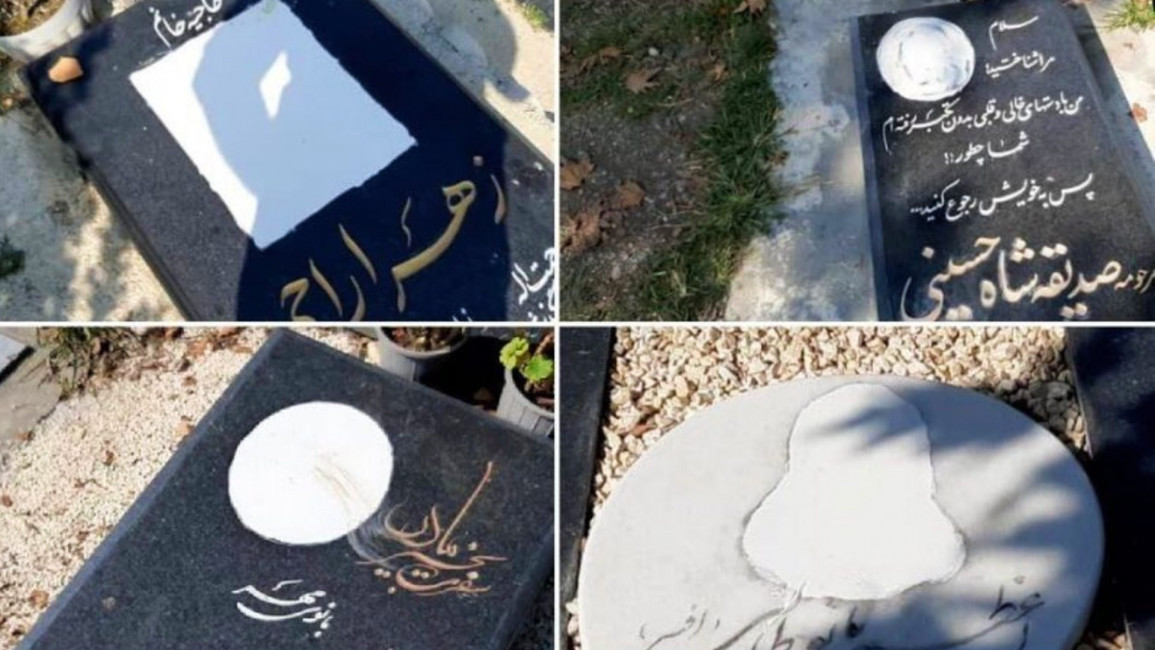Iran cemetery paints over gravestone images of deceased women
Iran cemetery paints over gravestone images of deceased women
A cemetery in northern Iran has provoked upset after covering the gravestone images of women with paint.
2 min read
The images were later restored following complaints from relatives [Twitter]
An Iranian cemetery shocked locals this month after covering the gravestone photos of deceased women with paint.
Upset relatives complained to local authorities after finding their female family member's gravestones had been defaced.
Widespread outrage led to the images being restored, Radio Farda reported, with cemetery officials in the northern city of Royan apologising for the "mistake".
"They said that placing the images of women on tombstones is not religiously correct," she said. "If that is true, why is it fine in other places [in Iran] and such a decision is made [only] in Royan?"
Ruhollah Mazandarani, another Royan local whose mother's gravestone image was covered in paint, said the decision showed "clear disrespect to the deceased and their families".
Orthodox interpetrations of Islam prohibit figurative depictions, although the branch of the religion most common in Iran, Shia Islam, is less stringent.
Critics of the cemetery's decision pointed towards misogyny, rather than religion, as the reason behind the gravestones' alteration.
Clerics in Iran have since clarified that the deceased women's gravestone images were permissible, although only because they were pictured wearing the Muslim headscarf.
"The tombs belong to elderly women, but even if they were young - since their images are with full hijab - there is no problem with them," said Royan Governor Ali Shadman.
Under Islamic law in force in Iran since its 1979 revolution, women must wear a hijab that covers the head and neck and that conceals their hair.
Follow us on Facebook, Twitter and Instagram to stay connected
Upset relatives complained to local authorities after finding their female family member's gravestones had been defaced.
Widespread outrage led to the images being restored, Radio Farda reported, with cemetery officials in the northern city of Royan apologising for the "mistake".
"We went to the cemetery to say a prayer and we were faced with that," local resident Fatemeh Haji Ahmad told state news agency IRNA.
"Seeing the tombstone without the picture of my mother was shocking. My mother's only wish was to have her image on her tombstone," she said.
Haji Ahmad said the cemetery's board had decided to cover the photos due to religious concerns."They said that placing the images of women on tombstones is not religiously correct," she said. "If that is true, why is it fine in other places [in Iran] and such a decision is made [only] in Royan?"
Ruhollah Mazandarani, another Royan local whose mother's gravestone image was covered in paint, said the decision showed "clear disrespect to the deceased and their families".
Orthodox interpetrations of Islam prohibit figurative depictions, although the branch of the religion most common in Iran, Shia Islam, is less stringent.
Critics of the cemetery's decision pointed towards misogyny, rather than religion, as the reason behind the gravestones' alteration.
Clerics in Iran have since clarified that the deceased women's gravestone images were permissible, although only because they were pictured wearing the Muslim headscarf.
"The tombs belong to elderly women, but even if they were young - since their images are with full hijab - there is no problem with them," said Royan Governor Ali Shadman.
Under Islamic law in force in Iran since its 1979 revolution, women must wear a hijab that covers the head and neck and that conceals their hair.
But many women have pushed the boundaries over the past two decades by allowing their veils to slide back and reveal more hair, especially in Tehran and other major cities.
Follow us on Facebook, Twitter and Instagram to stay connected



